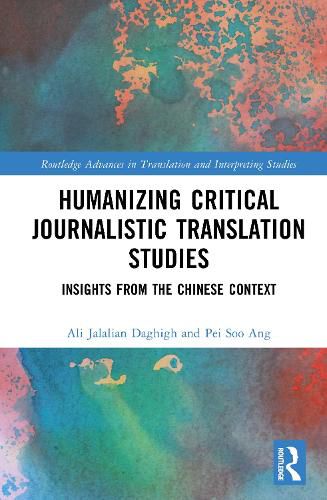Readings Newsletter
Become a Readings Member to make your shopping experience even easier.
Sign in or sign up for free!
You’re not far away from qualifying for FREE standard shipping within Australia
You’ve qualified for FREE standard shipping within Australia
The cart is loading…






Jalalian Daghigh and Ang's book provides new insights into the relationships between translation, journalism, ideology, and power via a humanizing approach. Carving out a niche within Journalistic Translation Studies, the book introduces and expands on Critical Journalistic Translation Studies (CJTS). The authors critically evaluate the state of the art while advocating for humanizing research by focusing on the experiences of both translators and readers.
Using the Chinese journalistic translation landscape as a case study, the book investigates the sociopolitical and socio-cognitive dimensions of journalistic translation. Through applications of sociological, cognitive, and critical discourse approaches, it sheds light on the working conditions of news translators, their cognitive and emotional experiences, the influence of power and ideology on the translation process, the effects of ideological manipulation on translated news texts, and the subsequent impact of such news on audience perceptions and emotions.
By opening fresh methodological pathways, not only does this book illuminate the Chinese journalistic translation landscape, but it also opens new avenues in CJTS. This book is an indispensable resource for academics, postgraduate students, and researchers in Translation Studies, Media Studies, and Journalism Studies, offering a transformative focus on humanizing CJTS.
$9.00 standard shipping within Australia
FREE standard shipping within Australia for orders over $100.00
Express & International shipping calculated at checkout
Jalalian Daghigh and Ang's book provides new insights into the relationships between translation, journalism, ideology, and power via a humanizing approach. Carving out a niche within Journalistic Translation Studies, the book introduces and expands on Critical Journalistic Translation Studies (CJTS). The authors critically evaluate the state of the art while advocating for humanizing research by focusing on the experiences of both translators and readers.
Using the Chinese journalistic translation landscape as a case study, the book investigates the sociopolitical and socio-cognitive dimensions of journalistic translation. Through applications of sociological, cognitive, and critical discourse approaches, it sheds light on the working conditions of news translators, their cognitive and emotional experiences, the influence of power and ideology on the translation process, the effects of ideological manipulation on translated news texts, and the subsequent impact of such news on audience perceptions and emotions.
By opening fresh methodological pathways, not only does this book illuminate the Chinese journalistic translation landscape, but it also opens new avenues in CJTS. This book is an indispensable resource for academics, postgraduate students, and researchers in Translation Studies, Media Studies, and Journalism Studies, offering a transformative focus on humanizing CJTS.